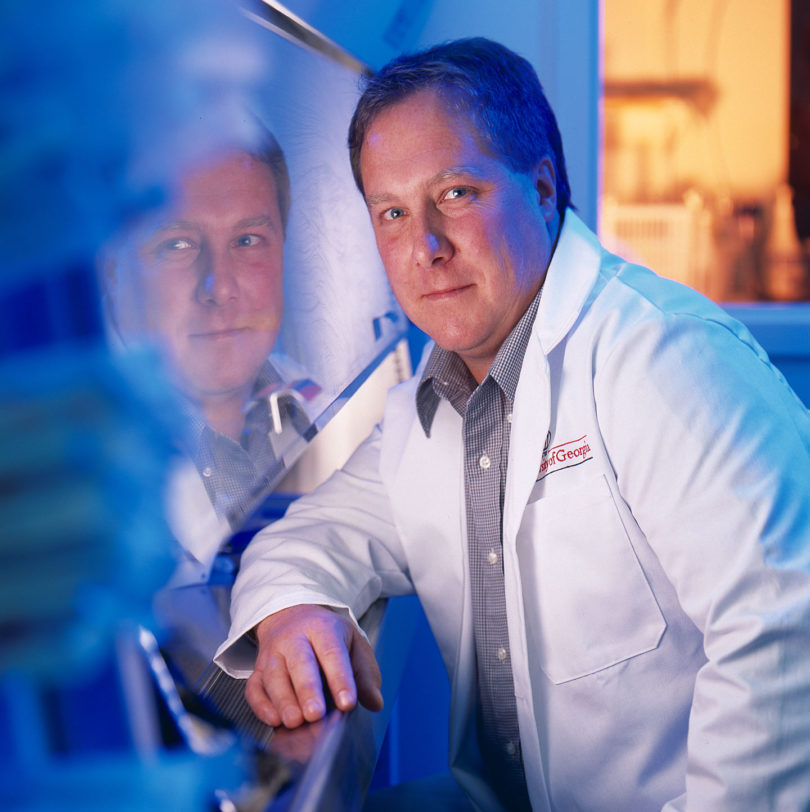Athens, Ga. – The University of Georgia announced today that it will receive Phase II funding through Grand Challenges Explorations, an initiative created by the Bill & Melinda Gates Foundation that enables individuals worldwide to test bold ideas to address persistent health and development challenges.
Ralph A. Tripp, a professor and Georgia Research Alliance Eminent Scholar in Vaccine and Therapeutic Studies in the University of Georgia College of Veterinary Medicine Department of Infectious Diseases, will lead a team in the pursuit of an innovative global health research project, titled “Improved Vaccine Production Technology for Rotavirus Vaccines.”
Tripp’s research team is receiving $1,327,570 to support the project, which involves identifying genes in vaccine cell lines that resist virus replication. This information is then combined with state-of-the-art gene editing technologies to create a new generation of high performance rotavirus vaccine manufacturing cell lines capable of sustained vaccine production at increased titers.
“As we demonstrated in our Phase I Polio program, also funded by the Bill & Melinda Gates Foundation, single gene modulation events can enhance virus production by greater than 20-fold in cell lines currently employed in vaccine production,” said Tripp. “In our next study, we will advance our innovative Phase I studies by demonstrating the applicability of this technology to a second vaccine-preventable disease, rotavirus. Rotavirus is the leading cause of acute gastroenteritis, which leads to severe diarrhea and vomiting. It is responsible for more than 500,000 deaths per year in children less than 5 years old.”
GCE grants seek to engage individuals worldwide who can apply innovative approaches to some of the world’s toughest and persistent global health and development challenges. To achieve this, GCE invests in early stage ideas that have the potential to help bring people out of poverty and realize their human potential. In 2011, Tripp was awarded a Phase I grant to test his theory that an enhanced poliovirus vaccine cell line could be created by silencing specific virus-resistant genes. The recent Accelerated Grand Challenges Explorations Phase II grant acknowledges the successes of the polio vaccine cell line program and offers a new avenue to provide affordable vaccine coverage worldwide through continued transition of genomics discoveries into the applied fields of biomanufacturing.
“In addition, as demonstrated by our proof-of-principle work on poliovirus where we have made enhanced vaccine cell lines, these studies will increase our understanding of the biology of virus replication as well as innate host defense mechanisms, host pathogen interactions and viral pathogenesis thereby further facilitating drug and vaccine discovery and development,” noted Tripp.
The project team, led by Tripp, is comprised of members of a unique academic-industrial-government consortium that includes the University of Georgia; Thermo Fisher Scientific Inc.; the U.S. Centers for Disease Control and Prevention; and the Murdoch Childrens Research Institute in Victoria, Australia, which is where rotavirus was discovered in 1973.
Co-investigators on the project include S. Mark Tompkins, an associate professor of infectious diseases at the college; Jon Karpilow, of Thermo Fisher Scientific, who has worked in programs associated with siRNA and shRNA design, as well as applications of RNAi technology to bioprocessing; Jon Gentsch and Baoming Jiang, scientists from the National Center for Immunizations and Respiratory Diseases, Gastroenteritis and Respiratory Viruses Laboratory Branch, Division of Viral Diseases, Centers for Disease Control and Prevention; and Carl Kirkwood, an associate professor at the Murdoch Childrens Research Institute, and head of the Australian Rotavirus Surveillance Program. These research teams will work with the University of Georgia to develop the methods to identify candidate cellular genes for silencing, and to develop engineered vaccine cells lines capable of enhanced rotavirus vaccine production.
About Grand Challenges Explorations
Grand Challenges Explorations is a $100 million initiative funded by the Bill & Melinda Gates Foundation. Launched in 2008, more than 800 people in 50 countries have received Grand Challenges Explorations grants. The grant program is open to anyone from any discipline and from any organization. The initiative uses an agile, accelerated grant-making process with short two-page online application and no preliminary data required. Initial grants of $100,000 are awarded two times a year. Successful projects have the opportunity to receive a follow-on grant of up to $1 million.
About the University of Georgia
Founded in 1785, the University of Georgia is America’s first chartered state university and Georgia’s largest and most comprehensive educational institution. More information on the university is available at www.uga.edu.
The UGA College of Veterinary Medicine, founded in 1946, is dedicated to training future veterinarians, to conducting research related to animal and human diseases, and to providing veterinary services for animals and their owners. Research efforts are aimed at enhancing the quality of life for animals and people, improving the productivity of poultry and livestock, and preserving a healthy interface between wildlife and people in the environment they share. The college enrolls 102 students each fall out of more than 800 who apply. For more information, see www.vet.uga.edu.








